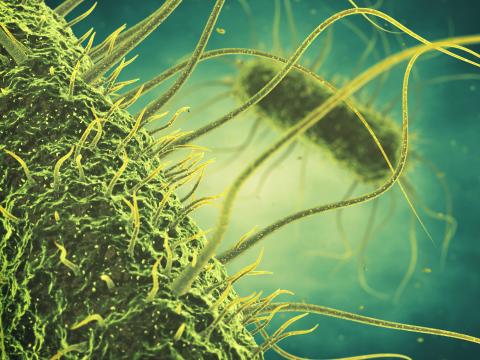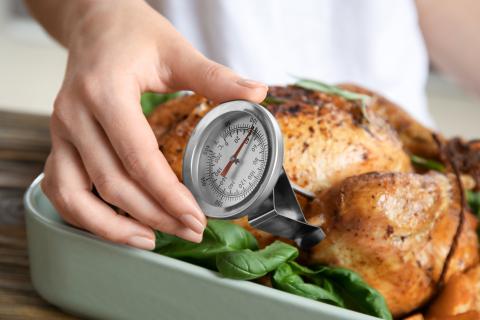Salmonellosis
Salmonellosis is a bacterial infection that usually affects the digestive system, and occasionally affects urine, the bloodstream, or other body tissues.
Salmonella is a common cause of diarrheal illness in Wisconsin.
Salmonella is spread by eating or drinking food or water with Salmonella bacteria in it, by touching objects with Salmonella germs on them, or by touching poop from infected people or animals.
Every year, the bacteria cause nearly one million illnesses spread by food nationwide.
To prevent salmonellosis, it is important to wash your hands often and properly.
About salmonellosis
People can get infected with salmonellosis by eating or drinking food or water with Salmonella bacteria in it
- Salmonella are commonly found in raw meats, poultry, eggs, and unpasteurized dairy products.
- It is important to wash your hands before and after handling food such as raw meats and eggs.
People can also get infected by contact with poop from people or animals that have salmonellosis.
- Salmonella can be found anywhere in the environment and commonly lives in the intestines of many types of animals.
- An infected person can spread Salmonella in their poop several days to several weeks after becoming infected.
- Some people, such as infants or people who have been treated with antibiotics, may carry the bacteria in their poop for months.
- About 1% of infected adults, and 5% of children under the age of 5 can carry Salmonella in their poop for over one year.
- It is very important to wash your hands often and properly, especially after contact with animals, such as chicks, dogs, cats, and reptiles, after going to the bathroom, and before eating or handling food.
Symptoms usually appear 12–36 hours after contact with Salmonella bacteria. However, they can occur as quickly as 6 hours or as long as one week after contact.
Common signs and symptoms include:
- Diarrhea
- Abdominal pain
- Fever
- Vomiting
- Bloodstream infection (uncommon)
Certain strains of Salmonella can be more harmful than others.
Children, the elderly, and those with a weakened immune system may have more serious symptoms.
Most people do not need antibiotic treatment and will recover on their own.
It is important to drink a lot of fluids to prevent dehydration while you are having symptoms.
- Always treat raw eggs, poultry, beef, and pork as if they are contaminated, and handle accordingly.
- Wrap fresh meats in plastic bags at the grocery store to prevent blood or juice from dripping onto other foods.
- Refrigerate foods promptly; minimize holding at room temperature.
- When refrigerating meats, place them on the bottom shelf to prevent blood or juice from dripping onto other foods.
- Use a designated cutting board for raw meat. Cutting boards and counters used for meat preparation should be washed with soap immediately after use to prevent cross contamination with other foods.
- Always wash hands with soap and water immediately after handling raw meat.
- Avoid eating raw or undercooked meats.
- Ensure that the correct internal cooking temperature is reached, particularly when using a microwave oven.
- Avoid eating raw or undercooked eggs or undercooking foods that contain raw eggs.
- Avoid using and drinking raw (unpasteurized) milk.
- Carefully wash hands with soap contact with animals, such as dogs, cats, and reptiles and farm animals; after going to the bathroom; and before eating or handling food.
- Make sure children wash their hands with soap before eating, especially after handling pets.
- Always carefully wash hands with soap after using the bathroom.
- Salmonellosis Fact Sheet, P-42088 (Multiple Languages): A fact sheet with general information on salmonellosis, including symptoms, treatment, and prevention.
- Salmonella and Backyard Poultry, P-01788 (Multiple Languages): A fact sheet with information on reducing your chances of getting salmonellosis if you have backyard poultry.
- Backyard Poultry: DHS webpage with information on backyard poultry and the diseases they can spread to humans.
- Farm Health and Safety: DHS webpage with information on how to stay safe when working and living on a farm.
- Reptile-associated Salmonellosis Fact Sheet, P-42082 (Multiple Languages): A fact sheet with general information on reptile-associated salmonellosis, such as how the bacteria are spread, treatment, and prevention techniques.
- Health Tips for Your Home, P-44970 (PDF): Healthy home tips including information on food handling and food safety.
- Handwashing: DHS webpage with information on good handwashing techniques to stop the spread of disease.
- Handwashing After Animal Contact, P-01699 (Multiple Languages): A fact sheet on how and when to wash your hands after contact with animals.
- Healthy pets - Healthy people (CDC): Information from CDC on how to keep pets healthy, and prevent them from spreading diseases to humans.
Provider information
This is a Wisconsin disease surveillance category II disease:
- Report to the patient's local public health department electronically, through the Wisconsin Electronic Disease Surveillance System (WEDSS), by mail or fax using an Acute and Communicable Disease Case Report, F-44151 (Word) or by other means within 72 hours upon recognition of a case.
- Information on communicable disease reporting
Wisconsin case reporting and public health follow-up guidelines:
- Salmonellosis (Nontyphoidal) EpiNet, P-01050 (PDF): A case reporting and investigation protocol for health professionals.
- Wisconsin Routine Enteric Follow-up Worksheet (PDF); Requires access to the Partner Communications and Alerting Portal.
- Wisconsin State Laboratory of Hygiene Clinical Testing Reference Manual
Wisconsin Local Health Departments – Regional offices – Tribal agencies
Clinical Overview of Salmonellosis for Health Care Providers: The CDC webpage covering clinical features of a Salmonella infection, diagnosis, treatment, and more.
Questions about salmonellosis? Contact us!
Phone: 608-267-9003 | Fax: 608-261-4976
Wisconsin Local Health Departments | Regional offices | Tribal agencies




